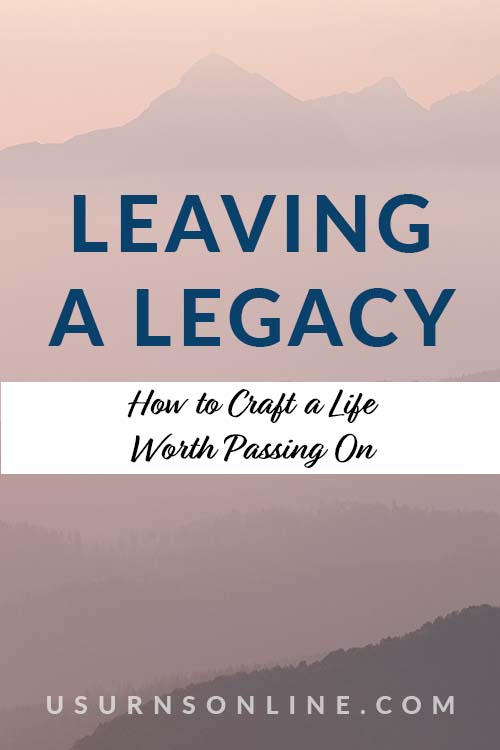Leaving a legacy means two things.
Today, we’re going to talk about both of those things.
What Is a Legacy?
First, legally and technically, a legacy refers to money or property left to someone in a will. “Dad left me a legacy of $10,000 after he passed.”
Second, abstractly and philosophically, a legacy is the values, outlook, and training that one person passes on to another. “My high school literature teacher left a legacy of joy in all things, inspiring her students to love reading across many genres and to continually seek to grow in our knowledge and appreciation of the world around us.”
So leaving a legacy means creating something rich and valuable in your life, which you then pass on to others who treasure and use it after your death.
Whether money, property, virtue, or skill, you are creating a legacy right now. It may be good or bad. It may be valuable or invaluable. And it may be passed on well or poorly.
Let’s talk about the best kind of legacy to leave, and how to pass it on to those you love in the best way possible.
Leaving a Legacy of Money, Property, and Wealth
Leaving a legacy is different from an inheritance. While laws may differ, and each person’s legal will might describe it differently, an inheritance is usually when the entire estate is passed on and divided between an individual (or couple’s) children.
A legacy is something that you specifically leave to an individual or organization. Practically, this means that you might leave a legacy of $10,000 to your alma mater, a legacy of $20,000 to your church, and a legacy of undeveloped property to a charity. You’ll then leave the remainder of your estate to your children as an inheritance.
To leave a legacy of financial or physical wealth, talk to your attorney. They will help you write or update your will.
Urns Made in the USA
Legacy Examples for Giving Wealth
Here are some examples of wealth that you can give:
- Money
- Investments
- Property
- Automobiles
- Collectibles
- Your business
- Tools and equipment
- Jewelry, gold, and other valuables
When thinking about the people you want to have your legacy, you undoubtedly think of your children first. But what if you never had kids, or what if there are others you may want to bless? Here are some ideas.
- Grandchildren
- Extended family
- Friends
- Pastor or clergy
- Business partner
- Someone you’ve mentored
- Charitable organizations
- Private organizations, such as:
- Schools & universities
- City parks
- Medical centers
- Hobby groups, festivals, conventions
- Museums & libraries
- Recovery programs
- Buddy/mentor programs
Leaving a Legacy of Virtue, Wisdom, and Skill
The only way you can leave a legacy of virtue, wisdom, and skill is to craft a life worth passing on. Then you have to actually pass it on.
If you don’t do both of those things, the legacy you leave will be much different than you probably hope.
After all, you can’t just dream about living a worthwhile life; you have to actually live it out. And you may have the idea that you’ll impart this in life lessons to your son or daughter, or to your children’s children. But once again, that doesn’t mean anything unless you take the time and effort to do it.
The key here is conviction. Are you absolutely convinced that your life will be poorer if you do not do these things? Do you want to do these things more than, say,
Personal Legacy Statement Examples
So, what does a personal legacy actually look like? Here is an example statement:
The legacy I would like to leave to my family, friends, and to the world is one of humble faith. As a husband, I want to leave my wife a legacy of genuine love, affection, and care. As a father, I would like to instill in my children a zeal for life, for the love and service of others, and for adventure, creativity, continual learning, and wisdom. For all who know me, I want to leave a legacy of trust in God and appreciation for all that he has done for me.
You can alter, adapt, and amend the above statement to your life, including your roles and responsibility, as well as the things you value.
Values and virtues:
- Adventure
- Affirmation
- Artistry
- Bravery
- Compassion
- Confidence
- Creativity
- Dependability
- Dignity
- Faithfulness
- Generosity
- Honesty
- Honor
- Humor
- Integrity
- Joy
- Order
- Passion
- Patience
- Responsibility
- Service
- Trustworthiness
- Truth
- Wisdom
- Zeal
Roles:
- Spouse
- Parent
- Grandparent
- Friend
- Employee
- Employer
- Citizen
- Volunteer
- Church member
- Leader
- Neighbor
Remember, it’s one thing to craft a beautiful, praiseworthy legacy statement. It’s much harder to go out a live it. Let’s talk about how to do that.
How to Leave a Meaningful Legacy
1. Think about what you’d like written on your tombstone.
Then live that way!
2. Evaluate the things you treasure.
The surest (and easiest) way to do this is by looking at where you spend your time and money. That is going to be your legacy.
Do you like what you see?
3. Work towards personal growth before you try to influence others.
Don’t get all fired up about passing on some idealistic torch before you begin living that way yourself. If you life doesn’t match up with your supposed values, no one is going to want to buy what you’re selling.
As Jesus said, take the log out of your own eye before you talk about the speck in another person’s eye.
4. Give your time to the people you care about.
It’s so easy for us to waste time and energy on work, hobbies, socializing with groups of friends who come and go, or even volunteering and serving others.
All these things are good, but what will your children say about you when you’ve spent every waking moment helping other people, who are in and out of your life in a matter of hours, days, or weeks?
5. Tell stories and share memories.
The stories we tell reflect our values, and they do so in an entertaining way the draws the family together.
6. Read aloud to your family.
Your family will remember the books you read aloud to them much more dearly than any you assign. It’s important to realize how much of your legacy involves your time and the way you use it.
7. Live for others.
Men seem especially prone to this fallacy: I’m spending long hours at the job to provide for my family, so that I can pass on to them a legacy of realized dreams, freedom from worry and poverty, and every need and want fulfilled.
In other words, I’m doing this (gaining wealth, advancing in career) for you. But here’s the thing: You may want to give them all these things, but what do they want?
Your spouse and kids (plus friends and extended family) probably just want more time with you. Don’t fall into the trap of thinking that because you provide for your family’s physical needs that you are fully caring for them. That’s a legacy of absenteeism, workaholism, and a lack of genuinely others-centered love.
Instead, live for others by taking the time to understand, what would really help and bless and inspire and encourage them? What do they want? If you don’t know, simply ask – they’ll tell you.
8. Write a legacy statement.
Use the examples above and consider these questions as you craft your own legacy statement:
1. Will I be remembered (beyond my family) ten years after I die? Twenty years, fifty years? If so, what will I be remembered for?
2. What is one characteristic, virtue, or skill that I would like my children to have?
3. What traditions would I like my family to continue?
4. What is the belief, worldview, or outlook on life that I want to pass on?
9. Live with the end in mind.
It’s not something we like to think about: You are going to die.
No one likes to think about dying, or growing frail, or having loved ones die. You certainly don’t want to obsess over it in a morbid way, but when you confront the fact of death head-on, it can clarify and crystalize what is most important to you.
It causes you to think about what truly matters. What did you do with your life? If you were to reflect on your life as you lay in your deathbed, whether next week or in 30 years, will you be proud of the choices you made?
Mindful of your own end, live your life now so that when the time comes you will be ready, and you will know that you’ve done all you can to leave a meaningful legacy to those you love.
10. Create a legacy plan.
This is where you begin taking steps to make this happen. Write out your to-do list. Then do it.
- Write a will
- Put your affairs in order
- Make funeral arrangements
- Write legacy letters to your loved ones
- Consider creating a legacy project
- Craft a legacy statement
- Create a plan to make your statement a reality in your life
What Is Your Legacy?
So now the question is, What will your legacy be?
Perhaps, as you’ve read this article, your thoughts drift to ways you need to change. Maybe you need a complete turnaround, or you may simply want to do more of what you’re already doing, and less of the things that distract you from what is most important.
Remember, it’s not too late to change. Reach out to family members and old friends. Sell your house and use the proceeds for… well, what legacy would you leave? Go and begin to live it!
Read next: Here’s How to Plan Your Own Funeral
Pin It





